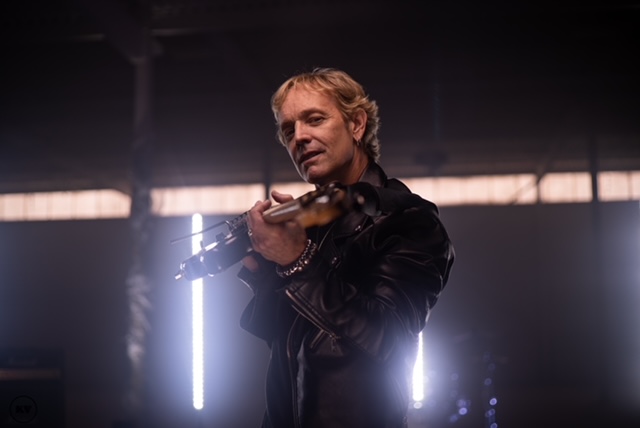Yes that is the unmistakable Sam The Record Man `spinning wheels’ logo depicted on the CD cover of Downchild’s new record release titled “Can You Hear The Music” (Linus Entertainment). Yet rather than just serving as an attention-getting design, there is a specific synergy between Sam `The Record Man’ Sniderman and the then formative Downchild Blues Band (now officially shortened to Downchild).
“It’s 1971 and my brother `Hock’ (Richard) and I had just recorded the band’s debut indie record which we titled “Bootleg” because it sounded like a bootleg recording, having been recorded over two nights at a makeshift studio in Toronto’s Rochdale College, “explained Downchild ‘s founder and lead guitarist Donnie Walsh, on the phone from his Burleigh Falls, Ontario residence.
“So I loaded a box of records into the trunk of my car and we drove down to Sam The Record Man’s main store on Yonge Street. Sam Sniderman himself is standing by the front door of his store, I walk in, explain to him my group had just recorded our debut album and would he mind stocking some copies in his store.”
“Sure” he replied. “Why don’t you display them in the front window!”
“Can you imagine some retailer doing that these days,” gasped Walsh. “Of course he didn’t even listen to the record but Sam Sniderman was such a supporter of Canadian music that he served as a source of encouragement to anyone who made the effort to make a recording. Just seeing that record of ours in the window of Sam the Record Man gave Hock and I an amazing boost of confidence, It served as an on-going source of inspiration for me to continue in this business.”
More than 44 years and 16 studio records later (plus numerous live, compilation and re-releases), Donnie Walsh is still cranking out the songs and bopping with the blues. He has produced the new record and written nine of 11 original tracks; lead vocalist Chuck Jackson wrote `My Mississippi Queen’ and bassist GaryKendall penned `Worn In’.
Recognized as the `Father of Canadian Blues’, Walsh has gone through over 85 musicians during the band’s lengthy tenure, sadly losing three key members; keyboardist Jane Vasey who succumbed to leukemia at the age of 32 on July 6th 1982, Walsh’s lead vocalist brother Hock suffered a fatal heart attack on December 31st 1999 and his off-again, on-again, replacement Tony Flaim also died from a heart attack just two months later on March 10th 2000.
[youtube width=”600″ height=”338″ video_id=”cCR1KDxAnZ4″]
“Yes it’s been tough, losing Jane at such a young age was really tough,” allowed Walsh who was also in a relationship with Vasey at the time. “I didn’t play music for quite a while,. It was tough to write when you are in such a depression. You come up with all this morbid stuff – that’s not what people want to hear.”
Fortunately, Walsh bounced back later that year with a new album, “But I’m On The Guest List” and the band’s lineup has been fairly consistent for the past 23 years with Jackson establishing himself as the band’s vocal sound, Michael Fonfara providing a distinctive keyboard signature and saxophonist Pat Carey, bassist Gary Kendall and the latest member to join, drummer Mike Fitzpatrick who was added to the lineup in 2004.
“I guess it’s a sign of maturity that I’ve been able to keep this lineup together for so long,” noted Walsh. “The players in this band just jell so well together.”
Cited as a great inspiration to the national blues music scene which has spawned the likes of The Jeff Healey Band, Matt Minglewood, The Powder Blues Band, Colin James, David Wilcox, Cameo Blues Band and Rita Chiarelli to name just a few, Walsh acknowledged that the blues scene was limited and there were only a handful of blues artists in this country when he first launched.
Heavily influenced by blues greats Jimmy Reed and James Cotton, Downchild struck pay dirt when their second record, “Straight Up” recorded in 1973, spawned to of the band’s biggest hit singles; `Flip Flop And Fly’ originally written and recorded by Big Joe Turner and Jesse Stone in 1955 and Walsh’s own composition; `I’ve Got Everything I Need (Almost)’
Those two songs (plus `Shotgun Blues’) took off into the stratosphere when Saturday Night Live TV stars Dan Akroyd and John Belushi, spun off a re-occurring SNL skit, The Blues Brothers into a recording; “A Briefcase Full Of Blues”. Supported by an all-star lineup which included Steve Cropper and Matt `Guitar’ Murphy, Duck Dunn and Paul Shaffer, the LP which featured all three Downchild tracks soared to No 1 on the Billboard charts in February 1979.
“The financial return of placing two compositions on a No 1 Billboard album was very rewarding personally,” smiled Walsh. “But it was the impact of having a Blues album top the charts, right in the middle of records released by the likes of Led Zeppelin, The Who, Queen and all those major rock stars. A Briefcase Full Of Blues made blues music acceptable to the masses.”
This hysteria carried on at least another couple of years when Belushi (as Joliet Jake Blues) and Akroyd (as Elwood Blues), modelled after the Walsh brothers, spun their characters into a 1980 hit movie,’ The Blues Brothers’ which also featured a top-selling soundtrack recording.
“Even before “A Briefcase Full Of Blues’ Dan (born in Kingston, Ontario) used to come and watch us play,” explained Walsh. “He and Gilda Radner were performing in a theatre production in Toronto and they used to come over after their show finished at 11, and the bars wouldn’t close until 2. And then, we’d go over to his booze can after we finished and we’d keep on drinking.
“Dan is a great guy. He really is into the blues and he was quite shocked when he met John Belushi and found out he was a heavy metal guy,” laughed Walsh. “It was like, `Come on! You’re from Chicago and you’re not a blues guy!”
Walsh and Akroyd have maintained a relationship over the years and they both appeared on stage together at Casino Rama in 2002 when Ackroyd was performing with the revamped Blues Brothers which featured John’s brother, Jim Belushi. “Even now when they sing `I’ve Got Everything I Need (Almost), Akroyd will acknowledge us by saying, “Now here’s a song by Donnie Walsh And The Downchild Blues Band from Canada.”
Throughout all of the musical trends which have developed over the years, Downchild have been consistently faithful to their blues roots, yet have found it increasingly difficult to find appropriate venues.
“The days of the blues bar circuit are long gone,” reflected Walsh. “We used to play blues bars five, six nights a week all across Canada, but not anymore. We used to tour the States a lot and even went over to Europe three times but these days we are lucky if we can get two nights in the same club. We have played some casino dates and a couple of festivals but our live appearances are now few and far between.”
[youtube width=”600″ height=”338″ video_id=”YxK8YamfnuU”]
Walsh acknowledges the entire music industry has changed in the advent of social media but says that when it comes to recording music, he’s still old school.
“I still believe in recording albums rather than going through all of that download stuff,” noted Walsh. “I write songs in batches and I normally have eight or nine to put on an album. “Can You Hear The Music” is like our first record in four years which is unusual for us, I am usually more proficient than that.”
Sparked by the familiar jump blues rhythm of ‘Flip Flop And Fly”, the lead off title track of ‘Can’t You Hear The Music’ Is vintage Downchild and there’s a solid mixture of blues-R&B (`I Need A Woman’, Fasten Your Seat Belt’ and more traditional blues arrangements like `Blue Moon Blues’ and `One In A Million’.
“Recording wise, the big innovation in the studio is the introduction of Pro Tools instead of digital tape,” Walsh explained.” I don’t know how many hours we used to waste rewinding tape.”
As for the future, Walsh says he is prepared to go with the flow and keep recording as long as he is inspired.
“Downchild doesn’t play often, but when we do it is still fun, he noted with dates in Ottawa and Hamilton just logged and future dates In Calgary scheduled for January. I still get a kick out of recording, it’s what I do, and it’s what I’ve always done.”
















